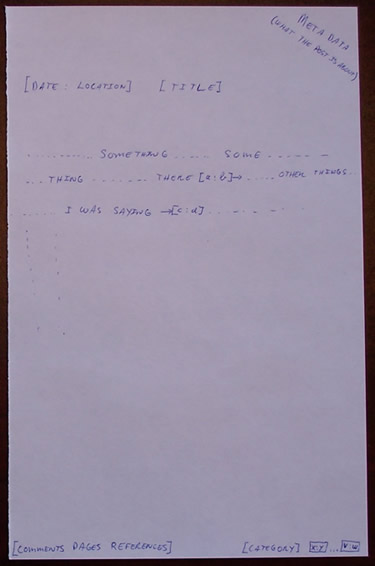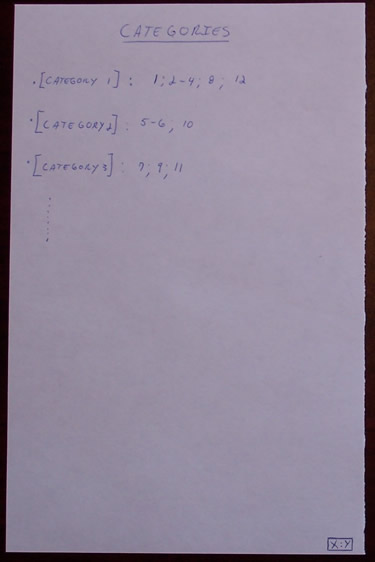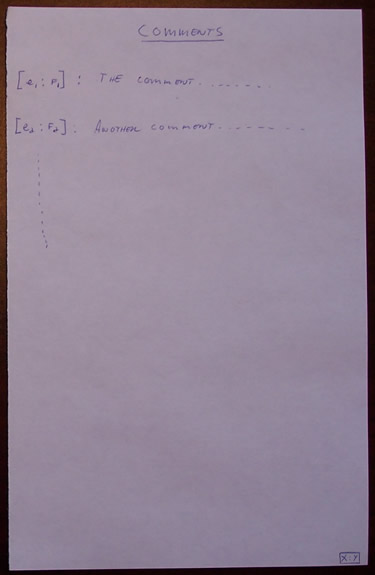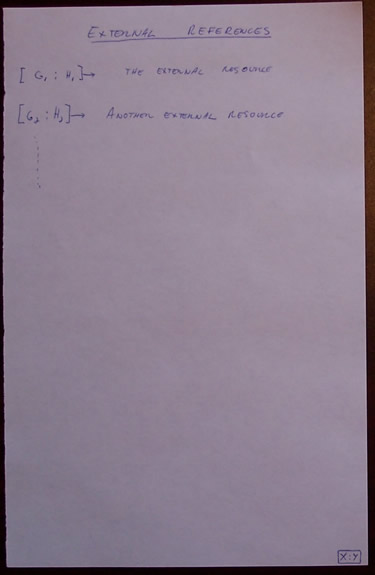Collective work on Moleskine’s notebook
What fascinate Moleskine’s community bloggers?
Some days ago I had written a post on Analog blogs. What’s an analog blog? This is a method used to utilize your Moleskine notebook as a blog. This is a way to organize it, to link your thoughts together to be able to follow the flow of your thinking through time. It’s sure that this method is usable with other notebooks but I demonstrated the concept with Moleskines. Why? Because I lately discovered a passionate community of bloggers that write with enthusiasm about them. They write hacks to enhance their usability; they write about what they write in them, how they use them, where they use them and why they use them. They are passionate, they write on Moleskines with their guts and inspiration. Then, as a neophyte in the Moleskines world and in his immerging community, I wanted to know why they are attracted by them, and overall, why they are fascinated by Moleskines.
After I published my post, I got an unanticipated exposure. I read posts and comments from other visitors and bloggers about it. I found that people seem to love the idea; they seem fascinated by the concept. It was not a great idea; it was just an aggregation of already know hacks with some enhancement based on an emerging communication technology called Blog. The more I read on reactions the more I find that people love the idea of wedding between new and old technologies. They love the paradox created by the situation. They seem to be seduced by the idea; as I am.
Finally I asked to some of these bloggers their fascination, in the present world of technologies, for Moleskines: a technology used by humans for ages. This article is the result of their work; their passion for Moleskines’ notebooks. I got their answer and texts one after the other. I I’m astonished by the result, the work they done. They are all great pieces of work. They are more than inspiring.
I need to thank you all for your great work. This post is not my work, it is yours! I’m really happy to have done this project with you. Thank.
To all of you readers: continue your reading and you’ll be rewarded!
— PS: I didn’t know how to present them; in which order to place texts; so I sorted them in family names alphabetical order
By Merlin Mann
We all make decisions about the extravagances that we’ll permit ourselves, and one of mine is picking up a fresh Moleskine every month or two. Moleskines don’t record your thoughts any more efficiently than a $.99 notebook would, but they have a satisfying weight to them, and writing on a Moleskine’s silky pages just feels a little bit fancy to me.
You could probably make a case that food served on paper plates tastes the same as it would on fine bone china, but that’s an awfully cynical point, and it certainly won’t win you many second dates. A sexy little notebook makes you feel good and–who knows?–you might find yourself taking an extra few seconds to think about what you’re committing to those lovely pages, to pause a moment and reflect.
With so many disposable, marginally useful items crowding our lives, it’s comforting to have a well-made book in which to set down your thoughts.
By L.S. Russell
English, the language not the country, was invented over sixty-five million years ago by a man, living in the Neander Valley, named Manfried Piltdown. He named his new invention after his best friend, Brian English, who had a bad habit of ending his sentences in prepositions. The two were inseparable best friends and spent many years together hanging out in Brian’s garage (which was really his parents garage but they let him use it as long as he promised not to set fire to the glass where his grandmother kept her teeth), inventing languages and watching porn. Brian would do all the talking and Manfried would scribble the words that came out of Brian’s mouth in a notebook.
All was well until Satan invented junior high school, and other institutes of higher learning like the adult book store. Satan decided that he needed to teach three things so he hired some smokin’ hot teachers then he invented math, and driver’s education. But he was fucked if he could think of a third thing-so he went to see Manfied and Brian.
The following is an actual transcript:
SATAN: Dudes! I just invented junior high school.
BRIAN: Wicked Satan! Do you have a class president yet?
SATAN: No dude. I need to teach three things; I’ve got math and driver’s ed covered but I’m fucked if I can think of a third thing.
MANFRIED: Dude! I’ve got just the thing. It’s called English. Me and Brian invented it-it’s sweet.
SATAN: Psycotic dude! I have a couple of smokin’ hot babes who can teach it. How much do you want for it? I got like five bucks on me.
Transcript ends.
So Brian and Manfried went into another room to talk about selling English to Satan so he could teach it in junior high school. Brian was totally against it, but Manfried was psyched. They argued until they smelled smoke coming from the other room. When they went in, Satan was nowhere to be found, but Brian’s gran’s teeth were in flames in the middle of the room. Brian’s mom and dad kicked him out of their house, and Brian and Manfried were never friends again. Brian went to live in Finland, and Manfried sold English to Satan.
Brian tried to re-invent his own version of English, called English Leather, but since Manfried had the notebook (and the name English Leather sounded gay) it was no use.
So you see, I use Moleskine notebooks because of the storied history of the English language-a great language deserves to be written in a great notebook.
By Mike Shea
First draft of the story… In a Moleskine!
Citizen Fred’s Book
Citizen Fredrick Joseph Abergale stared at the object sticking out of the dirt hill. He had worked on this trail for six hours now and it was the first man made object he had seen. When he awoke to the soothing voice of Citizen G giving him the job of inspecting and clearing the trails of Great Falls for that day, his heart sank. The trails were twenty kilometers away from the huge towers of the city and offered little distraction from the sharp cool air, the
frighteningly wide sky, and the sickly green foliage creeping all around him.
Static filled his earbud. He only caught bursts of the microshows and had no idea if he was supposed to laugh or mourn. Rarely did he hear the fanfare at the beginning or end of the forty five second microdrama or microcomedy so all queues for feeling were gone.
The silence covered Fred like a cloak. It squeezed him and dropped moments of quiet in the normal bustle of his mind. In twenty minutes he would return to the road where a gyrocoptor would take him to the supershuttle and back to his home on the two thousand forty sixth floor of dwelling tower 23.
Then he saw the object half buried in the hill. Only the corner of the rectangular object shined from under the dirt. A shining plastic covered the corner of the black rectangle. It frightened Fred to look at it. It was alien to him. He kicked at it with one dirt-covered work boot. More dirt fell and the object slid down the hill. With one gloved hand he reached out and pulled it free. The black rectangle was sealed in some sort of plastic bag with a complex
fastener at the top far different from the atomic fasteners Fred was used to.
Fred pulled at the seal and it popped open with a puff of stale dust. He pulled farther and the plastic cover burst open and fell of the black rectangle inside. He recognized it at once, though he had never seen one in his life.
It was a book.
Fred’s heart lept and fell all at once. He had never been so scared or excited. He had never seen a book before, though he had once seen a picture in one of the historical data archives. He didn’t know what it was and Citizen G would not tell him, but an ancient man Fredonce cared for in a Medicare center spoke of these books. Fred thought the man was senile. Now however, he held one himself.
Don’t Be Evil.
The words, the only law of the planet now, hammered in Fred’s head. What would not be evil? Should he destroy the book? Should he bury it? Should he take it with him and tell Citizen G of it on the gyrocoptor? That feeling of excitement filled Fred again. His fingers ran over the black oilcloth cover. An elastic band held the book closed. When he touched it, the elastic snapped like brittle rubber. It fell away in three small black pieces and all thoughts of turning the book in fell away along with them.
Fred opened the book.
Most of the characters of the first page were difficult to make out. Fred’s eyes, used to only reading the ideal font decided upon by Citizen G, had to trace over each character before recognizing it. One word and one four-digit number, once recognized, sent waves of electricity through Fred’s cold body.
“January 2005”
Truth dawned on Fred like hot sunlight. The small book he held was nearly five hundred years old. His hands trembled. What words filled these ivory pages? No one knew what life was like so long ago. Few cared. Now Fred would read the words of another person like himself from centuries ago. He would hear the voice and read the mind of someone dead for at least four hundred years. His last hesitation broke and he turned to the next page.
Fred struggled with the first few pages before subconsciously recognizing the strange handwritten letters and words. Soon, with script and language problems falling away with each word, Fred fell into the stories themselves.
When he looked up two hours later, Fred saw the last rays of sunlight reflecting off of the two-mile high datacenters to the south. He looked up at the criss-crossing white trails of the supertransports in the sky above him. For his forty years, Fred looked at these trails but only now did he really see them. They looked like a web.
He felt the words of the book seeping into his thoughts. He felt his previous ideas and beliefs crumble and fall. Like a rogue program tearing through a central processing unit, the stories of that book burnt all new paths and circuits in Fred’s brain.
Fred didn’t know what to do. He didn’t know that in eight months he would plant a home-made bomb that would send one of the Citizen G datatowers crashing into twelve others. He didn’t know that he would stand on this hill a decade later, lean and starving but never so alive. He didn’t know that his grandchildren, naked and brown and wielding flint-headed spears, would hunt down wild deer for food.
Fred walked silently to the waiting gyrocoptor, tucking the small black book into the deep pocket of his blue overalls. His mind was empty and his thoughts were clear. And he was not afraid.
By Todd Storch
Moleskine…why do I love you so?
You aren’t “high tech”.
You aren’t powered by a lithium battery.
You don’t have Bluetooth or WiFi built in.
You don’t automatically sync with my PC.
I can’t get email updates from you when items are completed or added.
I can’t access you via the web when you aren’t around.
You don’t sound any alarms when something becomes due.
I can’t beam any info to you via infrared.
I can’t attach you to a portable keyboard.
You don’t have fingerprint security options.
What is is about you Moleskine? I think I have some ideas why I love you…
You have a cool, elastic band to keep you closed.
You demand a good pen to write on you.
You challenge me to determine what sections should be in you.
You love it when I give each page its own page number.
You love that I talk about you on other’s blogs.
Other people ask me about you all the time.
I don’t have to worry about charging you each night.
I feel productive writing on your pages.
I put down more thoughts and ideas on your pages than I did in my PDA.
You love it when I cross reference my To Do list items to other pages with additional details
You love the 2 different colored tabs I use for “Work” and “Personal” sections.
Your back pocket is perfect for pictures of my kids.
You secretly remind me of my favorite Mead “Trapper Keeper” when I was
11 years old.
You are “Old School” hip.



